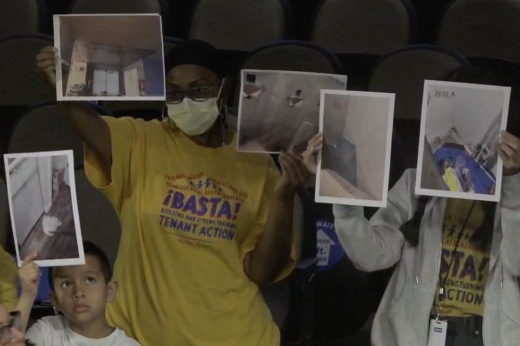While affordable housing remains a top priority for the county, commissioners are concerned with current trends that show some affordable housing units are suffering from poor property management and may be violating tenant rights, as demonstrated by Rosemont at Oak Valley Apartments.
During the meeting, board members from the Strategic Housing Financing Corporation shed light on issues within the affordable housing system, explaining that Travis County does not just need affordable housing units, but is also in need of a long-term system that ensures adequate property management and tenant rights. The board also mentioned working toward a clear list of expectations from residents.
Austin Housing Works declared the city is in need of 70,000 new affordable housing units in Travis County in order to meet the demand of rising population.
The Rosemont at Oak Valley Apartments had to undergo expensive repairs after being damaged in Winter Storm Uri. Since the storm, SHFC and the county have been faced with the financial burden of storm repairs and relocating residents. However, a year after re-location and $16 million worth of repairs and relocation costs, residents still report poor living conditions.
“What I’m hearing is that management companies are leaving, and if that’s the case then the standards are changing,” said previous Rosemont resident and board member Lisa Rheams.
Gabby Garcia, organizer at Basta—a tenants-rights non-profit—said on July 11 she knocked on the doors of nine Rosemont residents and found that every household had several repair issues.
Despite being told the apartment units were ready to move into by management, an independent mold company found mold and moisture in all five units they checked, Garcia said, adding that children who reside at Rosemont were getting sick and having to miss school from breathing in mold.
Rosemont resident Keyionde Goff reported that her unit was caving into the first floor, and she had to wait over a year to move to a downstairs unit that was accessible to her elderly mother.
“Units that were supposedly repaired had mold, had buckling floors, had clear cracks in the ceiling with what looked like water stains...” said commissioner Brigid Shea referring to her own experience walking through Rosemont.
Patrick Howard, executive director of the Strategic Finance Corporation, said during the meeting he is only expecting $10 million in reimbursement from the insurance company to cover the $16 million estimated total repair costs. In addition to suggesting SHFC consider fundraising to cover costs, Commissioner Shea also questioned why $16 million has not been enough money to fully repair the apartment complex.
“If you’re getting a $6-7 million bill, I wouldn’t accept the bill if the repairs look like that,” Shea said.
Affordable housing throughout the county
Rosemont is just one example of neglected affordable housing in Travis County.
“I’ve seen some of the housing out in Southeast Travis County. It was not cared for well. You had children running around in yards where there was broken glass. Is there anyone around who cares about that?” said Commissioner Margaret Gomez.
Travis County Commissioners expressed concern for the tenants at Rosemont and whether their needs are being met.
“Every human being ought to have access to good, safe housing,” Gomez said. “That’s what we need to be concentrating on as well. What are we doing to meet that goal?”
The meeting followed a February meeting where commissioners began the process of updating their affordable housing goals.
HousingWorks Austin, a nonprofit group that advocates for more affordable housing and assists the city and county with establishing and maintaining affordable housing goals, reports that there are currently 51,029 households living below the poverty level, which is an income of less than $27,497 a year, 165,062 households in the very low income bracket, making less than $55,150 a year, and 97,737 low-income households making between 55,150 and $88,250 a year.





